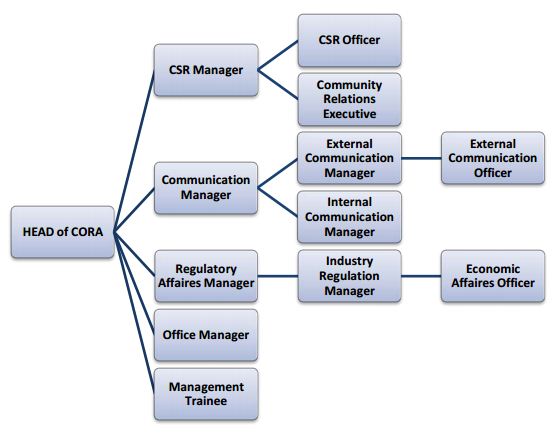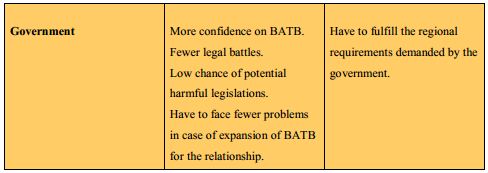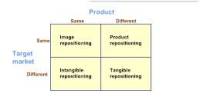This report is conducted with two principle aims. First one is to know the CSR activities bof British American Tobacco Bangladesh and the second one is to know how they are getting benefited from their CSR initiatives.
First part of this report is based on the introduction which includes topics like origin, objective, background, methodology, limitation of the study. Basically it defines the way and background of the study to prepare the report. The next part of the report highlights a brief about British American Tobacco Bangladesh and its history, its products, distribution network and its operational organogram.
In the main part of the report, I have explained the operations and the management structure of my assigned department Corporate and Regulatory Affairs (CORA). It was important to explain these because all of the CSR activities of BAT Bangladesh are controlled and operated by CORA. Later on I have explained the current CSR activities done by BAT Bangladesh. Finally I have tried to explain the benefits BAT Bangladesh is getting from their CSR initiatives. I have also tried to figure out the benefits and costs of the CSR initiatives depending on the perspective of different stakeholders of BAT Bangladesh.
At the end of the report, some recommendations are given which could be helpful for the proper understanding of the report. In a brief, this report contains all the essential and possible information related to the CSR activities of British American Tobacco Bangladesh and the expected benefits from these activities by British American Tobacco Bangladesh.
Introduction:
British American Tobacco Group is the world’s second largest quoted tobacco group by global market share, with brands sold in more than 180 markets. The business was formed in 1902, as a joint venture between the UK’s Imperial Tobacco Company and the American Tobacco Company founded by James ‘Buck’ Duke. With over 300 brands in their portfolio, BAT holds large market positions in each of their regions and has leadership in more than 50 markets. In 2011, they sold approximately 705 billion cigarettes.
Despite its name, derived from the home bases of its two founding companies, British American Tobacco was established to trade outside both the UK and the USA, and grew from its roots in dozens of countries across Africa, Asia, Latin America and continental Europe. In 2007, subsidiaries enabled governments worldwide to gather over £17 billion a year in taxes, including excise duty on our products, more than 7 times the Group’s profit after tax. BAT has sustained a significant global presence for over 100 years. Their business was founded in 1902 and by 1912 had become one of the world’s top dozen companies by market capitalization. BAT has over 55,000 employees all over the world. They always maintain a multicultural workforce. They always try their best to make almost identical decisions for every local stakeholder following a common framework of principles, standards, policies, strategies and
delegated authorities.
BAT is working appreciably with thousands of farmers internationally in the purpose of tobacco growing. The company provides agronomy support to the farmers for quality crop production as well as they maintain the whole procedure in an environmental friendly way. In 2011 BAT ran this cultivation process in 19 countries and had a notable success. They purchased approximately 440,000 tones of leaf grown by 200,000 farmers.
Methodology:
Objective of the report:
Primary objective:
Evaluating the CSR activities of British American Tobacco Bangladesh through finding the Corporate Social Responsibility initiatives of the company and its annual expenditure behind these.
Secondary objective:
Fulfilling the requirement of BUS400 course by the preparation and submission of my internship report on “The evaluation of the CSR activities of British American Tobacco Bangladesh”.
Data sources:
Primary sources:
Primary sources of data will be the people working at department CORA specially the people related with CSR and Internal and External communication of British American Tobacco Bangladesh.
Secondary sources:
Secondary sources of data will be the intranet of BATB, the official website of BATB and the annual report 2010 and 2011 of BATB.
British American Tobacco Bangladesh:

British American Tobacco Bangladesh is one of the largest multi-national companies in Bangladesh. They have over 1200 employees in Bangladesh. They are also employing 50,000 farmers, distributors and retailers indirectly. They have business contracts with 32,000 registered farmers who produce quality products. The dialogue of their business is “Success and Responsibility go together”. They are making high quality tobacco products for the diverse preferences of consumers and expanding the business from crop to consumers. They always believe that they are committed to the principles of corporate social responsibility. British American Tobacco Bangladesh is one of the first companies to be listed on the Dhaka and Chittagong stock exchanges. Currently it ranked amongst the top 10 companies in terms of market capitalization.
History: In this part of the world the presence of the company can be traced back to 1910. Almost 102 years ago the company began its journey as Imperial Tobacco by establishing its first sales depot at Armanitola in Dhaka. After having the partition of India in 1947, Pakistan Tobacco Company was established in 1949. The first factory in Bangladesh (former East Pakistan) was setup at Fauzdarhat in Chittagong in 1949. In 1965, the second factory (Present head office and factory) of Pakistan Tobacco Company was setup in Mohakhali, Dhaka. In 1972 after the independence of Bangladesh it became Bangladesh Tobacco Company Limited. In 1998, the company changed its name and identity to British American Tobacco Bangladesh.
Relationship of BATB with BAT Group:

Products:
The products of British American Tobacco Bangladesh are divided into four product segments for different types of customers. The segments are Premium, High, Medium and Low. The brands are given below according to their product segmentation-
- Premium- Benson & Hedges
- High- Gold Leaf, Pall Mall, Capstan
- Medium- Star, Scissors
- Low- Pilot, Bristol, Hollywood.
Competitors:
They consider their product segmentation for following their core competitors in Bangladesh. The competitive brands are given below according to the same segmentation.
- Premium- Marlboro
- High- Castle
- Medium- Navy, Rally
- Low- Sheikh, Marise, K2, Five Star, Tope 10, Nasir Gold, Sun Moon
In May 2008, Philip Morris International launched both full flavored and light variants of Marlboro brand cigarettes in different markets of Dhaka. Dhaka Tobacco Industries is manufacturing and distributing the brand. BAT Bangladesh and Dhaka Tobacco Industries together hold more than 80% of the cigarette market share. Tobacco products are distributed either by manufacturers themselves, third party distributors or wholesalers. The sales and distribution effort requires a large number of field employees and agents because they have to serve about 880,000 individual retail outlets throughout Bangladesh with a growth of 10% per annum.
Many of these outlets operate on limited capital and are unable to purchase quantities beyond their immediate daily sales. The high number of retail outlets has created a “stick market” and consequently imposed more frequent sales visits compared to other similar businesses.
Tobacco Regulation:
Bangladesh was the first country in South-East Asia to sign the Framework Convention on Tobacco Control (FCTC) in June 2003 and ratified the FCTC on 14 June 2004. The Government of Bangladesh enacted the Smoking and Using of Tobacco Products (Control) Act, 2005 on 26 March 2005 and the Smoking and Using of Tobacco Products (Control) Rules, 2006 were published on 29 May 2006, providing guidelines on advertisements, health warning
requirements and public place smoking.
Key highlights of the current legislation include:
• Package – 30% (of the total surface area of the pack) text only Health Warning (HW) in white with black background or vice versa; to be placed on the front and back panel of the pack. Graphic HWs are not required.
• Place – Smoking is prohibited in public places and public vehicles. However, it is allowed within designated smoking areas..
• Promotion – Bans on advertisement on TV, radio, print media, billboard and cinema. All sponsorships under tobacco brands are also banned. Product sampling and sponsorship under tobacco brands are prohibited. Restrictions apply for one to one direct marketing and communication at point of sale.
• Purchase – No person under 18 years is allowed to buy or consume cigarettes. However age verification is not mandatory for purchasing tobacco. Automatic vending machines are banned.
• Product – There is no requirement to publish or print the amount of TAR or nicotine. According to these laws, we can say that in whichever way the tobacco companies compete they are bound to follow these laws.
Distribution Network:
The infrastructure of the company has a broader field where the company plays its important role. BATB has 6 Regional Trade Marketing Offices (RTMOs), 12 Regional Sales Depots, 1 Factory, 1 Green Leaf Threshing Plant, 7 Leaf Depots and a Head office consisting of Corporate Head office and Production Head office. The Company’s Head office and Cigarette factory are located in Dhaka. A Green Leaf Threshing (GLT) Plant has been set up in Kushtia
and it has started operation from April 1995.
The company’s products are manufactured in the factory at Mohakhali, Dhaka. The Plant Manager who reports to the Production Director at the Head Office heads Dhaka factory. The company’ procures tobacco leaf maintaining the international standard and it imports processed tobacco leaf for its international brands. It procures green tobacco from the registered farmers of the leaf area mainly for its local brands.
The company’s authorized leaf areas are located in Kushtia, Chittagong and Manikganj. But bulk of tobacco leafs comes from Kushtia region. The Chittagong area is under development process and it now covers Rangunia and Lama. The company operates 7 leaf depots in the leaf area. Four of them are located in Kushtia region, 2 of them are located in Chittagong and other 1 is in Manikganj, The Company provides all sorts of supports to the registered growers through its depot personnel. This includes technical knowhow, agricultural inputs and financial assistance.
The company performs its sales and distribution operation all over the country through its five regional sales offices. They are located in Dhaka, Khulna, Chittagong, Sylhet and Rajshahi. Each of the regions is again divided into operational areas, each of which in turn is divided into territories. To perform its sales and distribution smoothly, the company operates 10 sales depots in different locations of the country and it has 63 authorized distributors.
Operational Network Organogram of BATB:
BATB has been operating its business under the following major functional areas:

Internship Experience
Job description:
In order to complete my graduation from Brac University, I have done my internship in British American Tobacco Bangladesh under the department Corporate and Regulatory Affairs (CORA). I was assigned to take care of managing the records of CSR related documents and helping to prepare any new documents based on different CSR related news. Although it was my main assigned work but I had to do other works as well in order to assist the management of CORA specially the communication side with other departments and maintaining the relationship with the stakeholders.
Critical observation and recommendation:
By giving the opportunity of internship British American Tobacco Bangladesh is helping the students of Bangladesh for gaining a great multinational working experience which will help the students to survive and compete in the real corporate world. I was always motivated enough to work hard because the management were so helpful and friendly in every aspects of the internship programme. I was given each and every facility for my assigned works which always encouraged me to finish the works on time with a positive outcome. Lastly I would like to say that British American Tobacco should continue the internship programme which will help them too for finding a potential employee which could be an asset for the company.
Project Analysis and Findings
Introduction of the topic:
British American Tobacco Bangladesh is one of the leading multinational companies in Bangladesh. The British American Group holds 65.91% share in the company. The Government owns 26.57% through several of its agencies, while 7.52% is owned by other stakeholders. In the world ranking of tobacco industries British American Tobacco is in second position. British American Tobacco Bangladesh has many departments and among them Corporate Regulatory Affairs (CORA) is one of the important departments. The main three functions of CORA are Corporate Social Responsibility, Communication and Regulation. Communication function has three wings Internal Communication, External Communication and Media Communication. The project will look at the CSR portfolio of British American Tobacco Bangladesh. It will then measure the visibility and acceptability of those CSR initiatives among the general public.
Corporate and Regulatory Affairs:
The Corporate and Regulatory Affairs Department (CORA) of the company is dedicated towards achieving the company’s strategic imperative, which is: To be a responsible company in an industry seen as controversial.
Globalization and increased inquiry of businesses by consumers and the general public mean that companies are today judged not only by the quality of products that they produce but also the manner in which they carry out their business activities. It is therefore, an imperative that corporate bodies are responsible not just in their businesses but also in the social domain that they operate in. British American Tobacco’s philosophy has been to be conscious corporate citizens wherever they operate, respectful of local cultures.
The company recognizes that it manufactures a product, which carries significant risks. In this light, the company believes that only informed adults should use its products and that underage persons should not smoke. It also believes that the company must act, behave and carry out its business activities in a manner accepted by society at large as responsible.
The Corporate & Regulatory Affairs function is charged with driving reputation management to the heart of the business and ensuring the company’s involvement as a leading development partner of the country.
The CORA Vision:
“To become the most respected FMCG Company among key stakeholders”
Reputation management involves identifying and prioritizing the company’s stakeholders and preparing and implementing plans to engage and communicate with these stakeholders.
A Web of Relationship:

Activities and Area of focus:
CORA helps British American Tobacco Bangladesh to:
• Build and sustain a corporate reputation, which in turn helps to ensure the future of the business.
• Build recognition for British American Tobacco Bangladesh as a responsible company in an industry seen as controversial.
• Identify Corporate Social Responsibility issues and come up with effective solutions.
• Communicate widely, clearly and proactively, enhancing understanding of the business and building a strong corporate brand.
• Build and manage relationships with BATB’s key stakeholders.
Structure of CORA:
The Corporate and Regulatory Affairs Department activities are lead by the Head of Corporate Affairs who is assisted by the Company Secretary and the CORA Managers. The company’s Legal and secretarial function also reports to the Head of CORA.

CSR activities by BATB:
“Success and responsibility go together” is the philosophy that has driven British American Tobacco Bangladesh. British American Tobacco believes that Corporate Social Responsibility is vital in ensuring that their business is sustainable for long-term shareholder value. They also believe that the business has a key role to play in helping society to achieve the necessary sustainable balance of economic growth, environmental protection and social progress.
The CSR activities which are being controlled by BAT Bangladesh are given below:
PROBAHO:
Recognizing World Water Day, BAT Bangladesh launched 5 new water treatment plants in Kustia and Manikganj on March 22, 2011. The ceremony was held with the undertaking of BAT Bangladesh in different districts to conserve water and to bring safe and clean drinking water to the people of Bangladesh.
So far, the Probaho initiative has installed 34 plants to remove arsenic and toxic elements from groundwater. The Probaho plants are situated in Kustia, Jhenidah, Meherpur, Chuadanga, Kurigram, Lalmonirhat, Satkhira, Tangail and Manikganj districts. These plants provide approximately 175,000 litres of pure drinking water for around 87,500 people daily. To celebrate World Water Day, an internal interactive campaign was held at BAT Bangladesh carrying alarming messages about Arsenic contaminated water to create naxinun awareness among all employees.
DEEPTO:
BAT Bangladesh has undertaken a project to install Solar Home Systems in remote areas of Chittagong Hill Tracts without any cost. The meaning of ‘Deepto’ is ‘Lighted’. Under this project BAT Bangladesh has already installed 576 units of Solar Home Systems in four remote villages in Bandarban and Khagrachari districts through BAT Bangladesh is giving rural families their first access to electricity at home.
British American Tobacco Bangladesh strongly believes that the business highlight responsibility in everything it does. In Bangladesh, around 50% of total people do not have access to the electricity. Bangladesh government has an agenda to bring the entire country under electricity services by the year 2020. Bangladesh has set a target to generate 5% of total electricity demand from renewable sources by 2015 and 10% by 2020. Renewable energy is such energy which comes from natural resources like sunlight, wind, rain, tides and geo thermal heat, which are renewable. British American Tobacco Bangladesh is contributing a lot in this target mission through providing free Solar Home Systems across the country.
AFFORESTATION:
British American Tobacco Bangladesh initiated this well recognized program to create mass awareness of the need for afforestation with the free sapling distribution program in 1980. Today, after more than two decades, BATB have contributed more than 4 crore 60 lac saplings to the country’s afforestation initiative. . The survival rate of these saplings stands at 90%. Most of these plants are located in Kushtia, Rangpur, Manikganj and Chittagong regions including the hill tracts. The trees have mostly been planted along roadsides, canal banks and farmers’ landholdings.
BATB is working towards achieving a balance between native and exotic species in terms of fast growing, fruit bearing, timber producing and medicinal characteristics in our afforestation program. In 2004, approximately 40 lac saplings in the ratio of 85:15 of exotic versus native species were raised countrywide for distribution. The afforestation program extended its realms to the Dhaka city dwellers from 1993, when the company started distributing saplings in Dhaka. As a mark of national recognition, the company received the Prime Minister’s 3rd prize in 1993 and 1st prize both in 1999 and 2003 for tree plantation.
Alternate Fuel:
Since 1980, BAT Bangladesh is exploring the alternate source of wood fuel needed to cure tobacco production in Bangladesh. Over the period, the company successfully replaced almost 100% of Flue Cured Variety (FCV) curing at Kustia by alternates such as jute stick, dhaincha sticks, paddy straw, industrial waste, sugarcane bagasse, rice husk etc. It is important to mention that 70% of FCV tobacco in Bangladesh is grown at Kustia.
Through our concerted effort and with the growing interest of the farming community, alternate fuel is increasingly becoming popular in Chittagong leaf growing region as well. At present, alternate sources are being used as wood fuel substitute. To meet the demand for wood fuel, every year we distribute 25 lac saplings free of cost in Chittagong.
Biodiversity:
British American Tobacco Bangladesh is following Biodiversity corners and also providing training to the farmers on biodiversity. BAT Bangladesh acknowledges that they have both an impact and dependence on biodiversity through their business operations and use of ecosystem services such as forest products, soil and water. For that, BATB has established 26 biodiversity corners on 25 acres of land with the help of their registered farmers in order to acknowledge their farming communities about the importance of different elements in nature and their contribution in the ecosystem. It exhibits the extinct species and their inputs for conserving nature.
Integrated Pest Management Club:
BAT Bangladesh established the first Integrated Pest Management Club in 2005 to support the farmers for better crop management in Checua Leaf Area, Kustia. BAT Bangladesh has established a number of IPM clubs at its different leaf growing locations in the purpose of making the farmers aware about the non-chemical alternatives to pest management and safe use Report on the evaluation of the CSR activities of British American Tobacco Banglades
of Agrochemicals. The objective of IPM clubs is to reinforce government initiatives to reduce use of agrochemicals. To improve the concept of IPM among the farmers, BAT Bangladesh has been running Farmers Field School (FFS) in partnership with Department of Agricultural Extension (DAE).
Moreover, IPM clubs are now contributing to create trained resources for IPM education and training.
Green Manuring with Dhaincha:
BATB provides the know-how and provide free seeds for ploughing and green manuring by the targeted farmers. These seeds are sowed in the fields and after these plants known as Sun Hemp (Dhoincha) reaches a certain height, they are ploughed and mixed with the soil. The cultivation of sun hemp increases soil‘s organic composition and is a eco-friendly sustainable method of soil enrichment. The company’s field experience suggests that 50% of the farmers
manage to successfully conduct seed multiplication from which they can internally source seeds for the following years. It has been reported through a study funded by BATB and undertaken by Bangladesh Agricultural University that the organic matter content of the soil is less than 1%.
Success will be measured against the positive shift in organic matter content in the reporting areas. Hopefully this initiative will make positive biodiversity contribution from eco-system rehabilitation and sustainable use perspectives
Compost Pits:
Compost pits are a source of natural fertilizers for the farmers. As a part of bio-friendly agricultural practices, they provide the know-how and bear full costs to install compost pits in the homesteads of the targeted farmers. This assistance is also supported by an ongoing awareness campaign. This contributes in significantly reducing dependence on the use of chemical fertilizers for agricultural productions while enabling to decrease the cost of production. Every year BAT Bangladesh targets to establish 80 compost pits in leaf growing areas.
Social contributions for farmers:
Sanitation support: To support the target for universal sanitation coverage, BATB provides costs to install latrines for farmers and these will be available for sharing within the village. This assistance is also supported by an ongoing awareness campaign. Till date they have distributed above 15,000 latrines among BATB’s registered farmers.
Monthly health check: BATB’s registered farmers are provided health care support from company depots every month. A doctor sits in the depot in a particular day each month so that the registered farmers can come and receive free prescriptions for their health problems.
Findings and Analysis:
Corporate Social Responsibility (CSR) has a variety of definitions from different individual and organizations. Some of the definitions can be cited here:
Michael Hopkins’s definition of CSR:
1. Corporate Social Responsibility is concerned with treating the stakeholders of a company or institution ethically or in a responsible manner. ‘Ethically or responsible’ means treating key stakeholders in a manner deemed acceptable according to international norms.
2. Social includes economic and environmental responsibility. Stakeholders exist both within a firm and outside.
3. The wider aim of social responsibility is to create higher and higher standards of living, while preserving the profitability of the corporation or the integrity of the institution, for peoples both within and outside these entities.
4. CSR is a process to achieve sustainable development in societies.
Mallenbaker Definition of CSR: “CSR is about how companies manage the business processes to produce an overall positive impact on society”
The World Business Council for Sustainable Development (WBCSD) Definition of CSR: “Corporate Social Responsibility is the continuing commitment by business to behave ethically and contribute to economic development while improving the quality of life of the workforce and their families as well as of the local community and society at large”
According to these definitions we can say that CSR involves commitment towards the employees of the organization, environment and society at large. Although the practice of CSR is ethical for the organizations that practice these, it can also be financially beneficial for that very organization at the same time. The basic drivers of CSR consist of three things. They are given below:
- Values: a value shift has taken place within businesses, as a result of which they now not only feel responsible for wealth creation, but also for social and environmental benefits
- Strategy: being more socially and environmentally responsible is important for the strategic development of an organization
- Public pressure: pressure groups, consumers, media, the state and other public bodies are pressing organizations to become more socially responsible.
British American Tobacco Bangladesh is operating their CSR activities following the actual meaning of Corporate Social Responsibility. We have already seen the CSR activities of BAT Bangladesh. Therefore we can easily relate their activities according to the actual standard of Corporate Social Responsibility. We can find them in different steps which are given below:
- Operational cost savings: They are investing in environmental efficiency and energy efficiency which is increasing their yields rates of return through cost savings or reduction of waste.
- Enhanced reputation: By good company performance and a wide range of CSR activities BAT Bangladesh is proving their longer sustainability power. They are ensuring the increase of their brand value through the enhanced reputation. As the industry of BATB is so much sensitive this is particularly important to them with high-value retail brands, which are often the focus for media, activist and consumer pressure.
- Increased ability to recruit, develop and retain stuff: By achieving the brand value after a great effort brought BAT Bangladesh to a new height that employees feel proud to be a part of it.
- Better relation with government: The formal and informal ‘license to operate’ is a key issue for many companies looking to extend their business or operating in politically unstable conditions. BAT Bangladesh is showing diligence in meeting social and environmental concerns which results in a reduction in red tape and a more cooperative relationship with government departments.
- Sharper anticipation and managing risk: As the industry is sensitive and risky enough, BATB is always ready to manage the potential risk through doing welfare of thestakeholders related to the business.
- Learning and innovation: Learning and innovation is the key to success and survival of all companies, not just those in knowledge-intensive and rapidly developing industry sectors. BAT Bangladesh is giving our country a wide range of learning opportunities through their innovative ideas for making a better Bangladesh.
After discussing all the matters related to CSR activities of British American Tobacco Bangladesh, we can roughly identify the benefits and costs associated with different stakeholder groups regarding implementation of CSR activities:


Recommendation and Conclusion
Recommendations:
Increase investment in the health sector
It has been observed from a research that health sector is one of the sectors in which stakeholders expects a company to invest more. Through the social reporting process and the dialogue sessions BATB has come to know that its stakeholders expect the company to invest a lot in the health sector. One issue is that as BATB is operating in the market that sells a risky product the company should increase its CSR investment in health sector. At present BATB is providing health assistance to its growers and has recently planning to bring the farmer’s family under a regular clinical service.
Increase reach of the education assistance provided by BATB
British American Tobacco Bangladesh has shut down an educational project ‘Dishari’ for last two years. Although BATB is still providing educational assistance but to a very limited number of students. To gain effectiveness and visibility the company should widen the reach of its educational assistance.
BATB should invest more in acid/dowry prevention/ drug prevention
The people of Bangladesh are seen to react more to emotional issues like rehabilitation of acid burnt women, drug addicts and so on. This goes to explain strong presence in these fields. BATB has no presence in these fields at present. Thus it is recommended that when BATB moves to different areas for their CSR projects, these are the areas where the stakeholders expect BATB’s existence.
BATB should strengthen the afforestation program outside its growing region
British American Tobacco Bangladesh is doing a praiseworthy job in the afforestation of the country. But British American Tobacco Bangladesh can expand the afforestation program to other areas apart from the growing region. This is advised as engaging in afforestation only in the growing regions might give the general people an idea that BATB is doing it only for their business need (woods was a major source of fuel used in tobacco curing, though BATB is now encouraging the use of other alternatives). If the afforestation is done beyond the growing region, the effort will gain visibility as a social contribution. Therefore BATB will be able to achieve its goal in vast by being recognized as a responsible company.
BATB should increase investment on the other CSR initiatives equally
British American Tobacco Bangladesh is doing wide varieties of community services but is not gaining even a minimum amount of visibility to the general public like us. One reason is that the company is spending too much on some initiatives and too little on some other. This discrepancy can pull the average performance down. Thus the company should invest in all the initiatives with equal importance.
BATB should publicize the CSR activities more
With the enactment of the new law and the other laws prevalent for the company many doors of communication is being shut down for BATB. However the company should not hold back the communication of the welfare that it is doing for the society. Bringing out the success stories and revealing them to the general mass will help BATB gain more effectiveness and visibility of the CSR activities that the company is undertaking. Considering this purpose only, our government should help them and as well as encourage them to take more CSR initiatives in future.
Conclusion:
British American Tobacco is doing a praiseworthy job in the Corporate Social Responsibility sector but is lacking the effectiveness and visibility due to limited communication. The company wants to establish itself as a benchmark company in CSR activity. To gain this reputation, the company needs to focus more on the communication of the brilliant Corporate Social Responsibility initiatives that the company is undertaking. The company should be more vocal about its achievements and in turn gain effectiveness, visibility and hence appreciation.
















